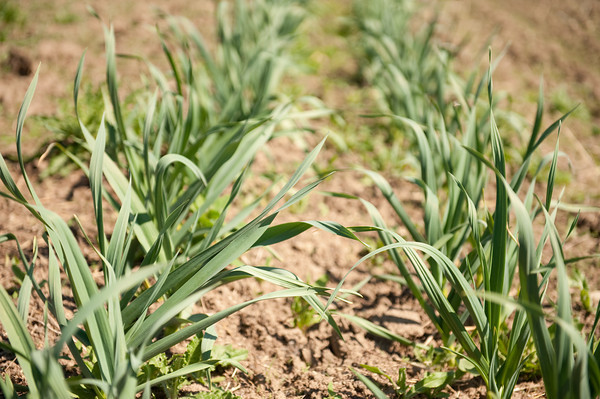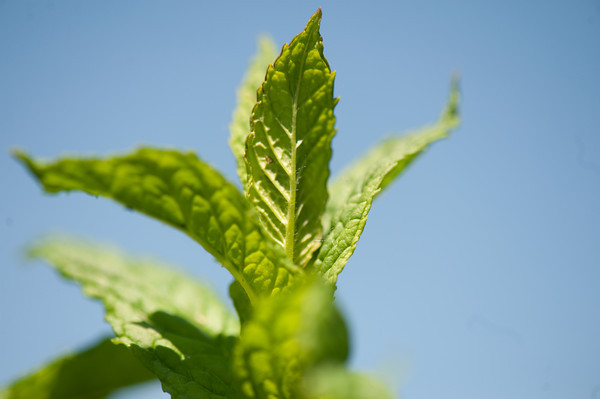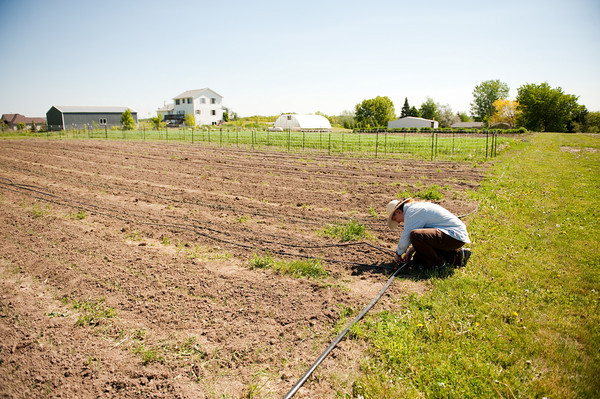
University of Minnesota Agriculture student Ruth Burke is spending this summer interning at a CSA farm called Cramer Organics of Delano, MN. Throughout the growing season, she’ll share weekly updates about the experience with readers of the Heavy Table.
Part 4: “First Impressions”
A few weeks have gone by and I’d like to describe some first impressions of, well, everything. I’ve had many realizations about the form and function of community supported agriculture (CSA). I’ve also had a few insights as to my personal connection with CSA and how my dream of farming means a lot more to me than I previously thought.
With regards to the realizations I’ve had about CSA forms, I must admit that I was pretty naïve before this summer started. I had this mental idea that organic farms were the same thing as CSAs. This is most certainly not the case! CSAs do not necessarily have to be organic, and there are definitely many organic farms that do NOT sell individual shares. There are many models of CSAs as well; they form a spectrum of sorts. There are CSAs that are entirely member-run and operated on one end of the spectrum, and on the other end you have subscription CSAs where members simply contribute a set dollar amount at the beginning of the season and have no other contact with the farm other than to pick up their shares. And of course, there are many that fall somewhere in the middle. As far as function, many opinions abound on the role a CSA should play. Here’s my personal take:

The main idea behind CSAs is to connect a specific community with a specific farm. This relationship is a connection among the people who eat the produce, the farmers who grow it, and the land from which it is grown. However, this relationship goes beyond food. Depending on the CSA model, this relationship creates a thriving community of people conscious of where their food is coming from, and who is growing it. I would even suggest that this relationship could be very spiritual, if that is your bent.
What do I mean by spiritual? Well, I can only explain this in terms of my own understanding, but I feel as if being a part of this relationship gives me a purpose. When I work with plants (which I have been doing for many years now), I feel as if a blanket is thrown over the rest of the world and my focus can narrow to just one thing: the plant in front of me. At no other time am I able to shut things out. I am constantly distracted by a multitude of thoughts and sounds when I’m studying, in lecture, exercising, even when I’m trying to sleep! However, when I’m digging in my garden, or watering my houseplants, or even working in the greenhouses at school, my mind goes silent. And in these moments I can see the connection between nature and myself. I can see how my actions affect the plant I am tending and how that plant affects me. Working at Cramer Organics is no different; it’s just larger.

Suddenly I can connect how my actions are a part of the larger cycle. I work the earth, replenishing the soil, and am rewarded with produce. Furthermore, I help to feed the many people that are members of our CSA. I can be proud of my work, because I am an integral part of that relationship that I described earlier. Essentially, I have a purpose. And isn’t the debate of humans’ purpose on earth one of the central questions for many religions? Naturally this purpose would not suit everyone, but I am inclined to believe that we must find our own purpose and then live accordingly. Therefore, I feel that for some people, CSA is quite spiritual (and you can count me among them).
Don’t get me wrong. I don’t mean to imply that CSA or organic farming is nothing but spiritual bliss. It is far from it. I don’t want to fall into the trap of romanticizing farming (although I recognize that my previous descriptions of CSA being spiritual belie that statement). I’ve discovered that my estimation of the physical aspects is quite accurate. It’s hard, dirty, sometimes tedious work — exactly what I expected. I used to landscape and I also used to work as a package handler for UPS, so this type of labor is not foreign to me. And although I enjoy the work now (even the monotony of hoeing weeds), I’m sure my appreciation of certain aspects will eventually wear off. It’s also a lot of work for relatively little pay. There are very few wealthy organic farmers (contrary to popular belief). Then again, most small farmers in general (be they organic or otherwise) are not “rolling in the dough,” and honestly, money doesn’t mean that much to me. Should I let these concerns stop me from pursuing a career in agriculture? Nope. I am beginning to realize that only time will decide whether this is something I will stick with all my life, or whether it is a passing phase that I will go through. Either way, I can’t know right now. But I’m okay with that.
(Visit our full archive of this feature)


Thanks Ruth for sharing so beautifully about this…I totally know what you are saying about the meditative aspect you describe, it is so powerful. I highly recommend a series of books by Vladimir Megre about an avatar-like woman who he met in Siberia named Anastasia…….she is completely one with nature and super wise..and she teaches him so much fascinating wisdom about nature and gardening and the connections. These books were best sellers in Russia and now are being translated to many languages. http://www.RingingCedarsofofRussia.org sells the books…
“However, when I’m digging in my garden, or watering my houseplants, or even working in the greenhouses at school, my mind goes silent. And in these moments I can see the connection between nature and myself. I can see how my actions affect the plant I am tending and how that plant affects me.”
-Right On.